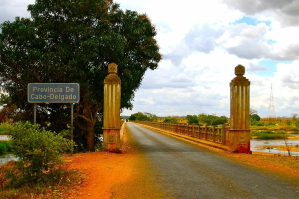
Jihadist insurgents in Mozambique are targeting Christians as they ramp up attacks in the country’s northern-most province, just as neighboring countries are planning to withdraw troops helping government forces to fight them.
The Mozambique army with help from neighboring countries had restored calm to the Cabo Delgado Province last year, but insurgents loosely linked with Islamic State have returned with a series of fierce offensives since January that have driven at least 80,000 civilians from their homes, most of them Christians, according to The Telegraph.
Cabo Delgado’s population is about 54 percent Muslim, and the insurgents seek not only to establish a strict Islamic state but address grievances of discrimination and neglect by the government of the country that is majority Christian (56.4 percent), mainly Roman Catholic, according to analysts.
Insurgent military campaigns have included the burning of several church buildings in southern Cabo Delgado’s Chiure District, which is 42 percent Catholic and 44 percent Muslim, The Telegraph reported.
The Islamic State has lauded the offensives, provided some financial help and has maintained contact with the rebels, but the terrorist group does not exercise command and control of the insurgents, according to the International Crisis Group.
Initially known as Ansar al-Sunna, the insurgents claimed affiliation with the Islamic State in 2019. Locally the group is known as Al-Shabab, which comes from the Arabic word for youth, but the militants are not related to Somalia’s Al-Shabab rebels.
Eyewitnesses have reported beheadings and kidnappings, displacing at least 800,000 people since 2017.
The attacks have prompted Catholic leaders to urge church members to leave Cabo Delgado. Earlier this year Bishop Antonio Juliane Ferreira Sandramo told Catholic charity Aid to the Church in Need that church members have fled to avoid attacks in dozens of village “where all Christian chapels were destroyed.”
The jihadist ideology undergirding the rebels is evident. When the insurgents attacked a passenger bus in Cabo Delgado in February, they left two hand-written notes, one in English and one in Portuguese, after abducting and executing the driver, noted Raymond Ibrahim, a widely published expert on Islam.
“We declare war on all Christians in the world for three things: either to be a Muslim or pay Jizya [a tax on Christians and Jews who refuse to convert to Islam],” the note read. “If you haven’t pay Jizya it’s a war until final earth, Qiyama. [war to the ends of the earth until Resurrection Day.] To Muslims we announce peace to all the world. Let’s work together to defend the religion of Allah together. If you [Christians] refuse [to convert to Islam] then you will pay Jizya and if you refuse to pay Jizya you will be killed.”
Ibrahim wrote that two days later, “the terrorists stopped another bus and forced its Christian passengers to relinquish all their money on pain of death.”
The rise of Islamic extremism in Cabo Delgado and other norther provinces has been devastating for Christians, according to Open Doors, whose 2024 World Watch List (WWL) of the 50 countries where it is most difficult to be a Christian ranked Mozambique 39th.
“Churches have been burnt down, pastors abducted, and many killed,” according to the WWL report. “The objective of these groups is to establish a strict Islamic state, and Christians are often targeted as symbols of resistance to this extremist ideology.”
Christians are often caught in the crossfire between government forces and jihadist groups, the report noted.
“Mozambique has also become a major hub for drug trafficking, with the presence of cartels contributing to a climate of lawlessness and violence, which indirectly affects the Christian community,” the WWL report stated. “Church youth workers are particularly at risk, as they are often seen as threats to the cartels.”
The rise of Islamist groups in the northern regions of Mozambique has been especially worrying for Christians, according to the WWL report.
“There have been fears that the jihadists would expand into provinces outside Cabo Delgado,” it noted. “Beyond military operations, the government is not taking meaningful policy actions to address the root causes of the conflict and to tackle the growing influence of the jihadist group.”
As feared, the insurgents have expanded their offensives beyond Cabo Delgado, attacking Nampula Province this month.
“The situation is deteriorating rapidly,” Johan Viljoen, director of the Denis Hurley Peace Institute of the Southern Africa Bishops’ Conference, told The Catholic Herald on May 15. “Attacks are now in the south and north of Cabo Delgado. For the first time, the insurgents have crossed the Lurio River and are attacking in Nampula Province.”
At the same time, more than 50,000 Internally Displaced People reportedly fled fighting in Cabo Delgado in May and were seeking refuge in Nampula, according to The Catholic Herald.
After fighting erupted in Cabo Delgado in 2017, the insurgents scored a major victory when they took the town of Palma in 2021, and troops from countries in the region began assisting Mozambique’s military.
After the insurgents made a tactical retreat last year, in January the Southern African Development Community (SADC) announced that it would withdraw its forces when its commitment to help Mozambique expires in July, according to The Catholic Herald. Botswana and Lesotho withdrew their militaries in April, and Angola and Namibia were following suit in May.
“South Africa announced in April it will keep its troops in Cabo Delgado until the end of the year, under SADC auspices but not part of the current mission,” The Catholic Herald reported. “It will also leave behind 200 other personnel until March 2025 to tackle ‘illegal maritime activities’ along the Mozambican coast.”
Rwanda, by contrast, is deploying an additional 2,500 troops to help Mozambique combat the insurgents in Cabo Delgado, Rwandan President Filipe Nyusi said on May 19. Nyusi said on state-run radio the troops are needed because Mozambique must not be left alone to fight terrorism.
Photo: Bridge over Rio Lurio, border between Nampula and Cabo Delgado provinces in Mozambique. (F. Mira from Lisbon, Portugal)






